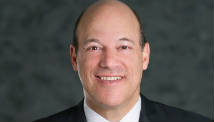Former Sen. Chuck Hagel was nominated by President Obama for defense secretary.
STORY HIGHLIGHTS
- In 2006, Hagel said 'the Jewish lobby intimidates a lot of people up here'
- Ari Fleischer: The support for Israel isn't because of 'intimidation,' but merit
- Polls show most Americans view Israel favorably, but don't support Iran or Palestinians
- Fleischer: Israel is a steady friend of the U.S. and a tolerant democracy
Editor's note: Ari Fleischer, a CNN contributor, was White House press secretary in the George W. Bush administration from 2001 to 2003 and is the president of Ari Fleischer Sports Communications Inc. He is a paid consultant and board member for the Republican Jewish Coalition, which opposes the Hagel nomination. Follow him on Twitter: @AriFleischer
(CNN) -- "The political reality is ... that the Jewish lobby intimidates a lot of people up here." -- Senator Chuck Hagel, 2006
As a result of those words and his voting record, former Nebraska Sen. Chuck Hagel's nomination has turned a decades-long, bipartisan confirmation process for secretary of defense into an acrimonious one.
While some leading figures such as the Anti-Defamation League's Abe Foxman and the Simon Wiesenthal Center's Rabbi Abraham Cooper say Hagel's words are borderline anti-Semitism, I'm less worried about anti-Semitism and more worried about the judgment of a potential defense secretary who thinks Israel has won support because of "intimidation," not merit.

Ari Fleischer
Israel is widely supported by the American people because Israel deserves to be supported. Israel is a lonely democratic ally and a steady friend of the United States in a dangerous and tumultuous region. Their people are like the American people -- free, independent, capitalistic and tolerant.
A Gallup poll taken last year showed 71% of the American people view Israel favorably while only 19% view the Palestinian Authority favorably and just 10% view Iran favorably.
In a Pew Research Center study last month, 50% of adults said they sympathize more with Israel in its dispute than with the Palestinians. Just 10% sympathize more with the Palestinians, while about as many (13%) volunteered that they sympathize with neither side.
Contrary to Hagel's logic, Israel doesn't enjoy widespread American support because anyone -- from any faith -- intimidated someone else; Israel earned the support of the American people because of its people's values.
Opinion: Hagel is a friend to Israel
The danger in what Hagel said is if he thinks Israel is supported on Capitol Hill because of intimidation, then it's not hard to see why Hagel is so soft in his support for our ally. He sees himself as an independent voice willing to stand up to intimidation, and he wears his anti-Israel votes as badges of honor.
But Hagel isn't independent. He's alone.
His position on Middle Eastern matters is so outside the mainstream of both parties that almost no one agrees with him.
In 2000, Hagel was one of only four senators who refused to sign a Senate letter in support of Israel.
Peter Beinart: What's behind Hagel nomination fight
The following year Hagel was one of only 11 senators who refused to sign a letter urging President George W. Bush to continue his policy of not meeting with Yasser Arafat until the Palestinian leader took steps to end the violence against Israel.
John Cornyn: Why I can't support Hagel
Contrary to America's longstanding bipartisan position, Hagel has called for direct talks with terrorist organizations Hamas and Hezbollah. In 2007, Hagel voted against labeling the Iranian Revolutionary Guard Corps, the group responsible for the death of many American servicemen in Iraq, a terrorist organization.
And in 2008, he was one of two senators on the banking committee to oppose a bill putting sanctions on Iran. One of the measure's biggest backers was an Illinois senator named Barack Obama.
I'm a New Yorker and neither of my senators -- Chuck Schumer and Kirsten Gillibrand -- supports Israel because someone muscled them into that position through intimidation. They both support Israel because the lobby that wants them to support Israel is an American lobby, made up of people from both parties and all religions and from people with no religion or political party at all.
But if Chuck Hagel believes that it's intimidation and not sound judgment that has caused his colleagues to support Israel, then Chuck Hagel should not be confirmed as our next secretary of defense.
Follow us on Twitter @CNNOpinion
Join us on Facebook/CNNOpinion
The opinions expressed in this commentary are solely those of Ari Fleischer.














